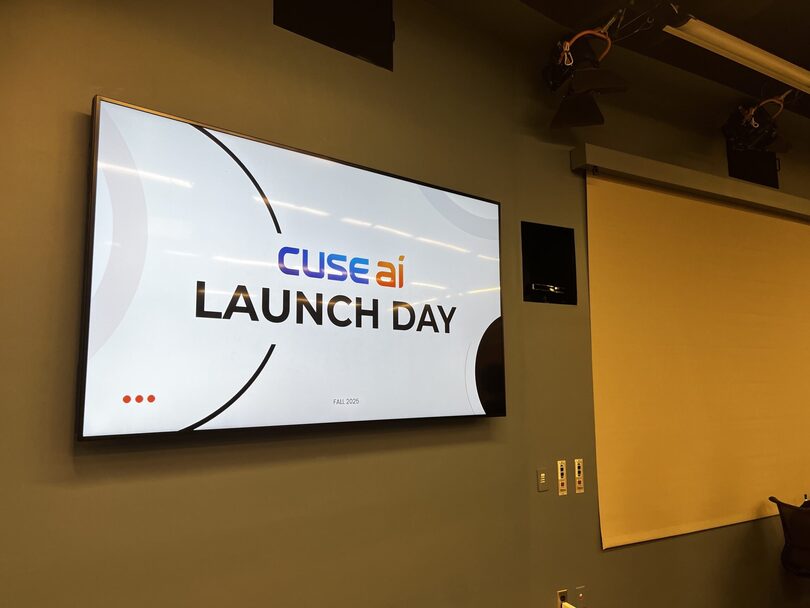100-member Cuse AI draws from over 40 SU majors to examine emerging tech

Cuse AI is the first registered student organization focused on artificial intelligence at Syracuse University. The club, which has over 100 members, facilitates learning about AI and discusses updates to the technology. Owen Smith I Contributing Writer
Get the latest Syracuse news delivered right to your inbox.
Subscribe to our newsletter here.
Although Sami Carnahan is majoring in health and exercise sciences, she “found a place” on campus in Cuse AI. She joined the artificial intelligence-focused organization to show that students from non-technical majors can also pursue related fields.
Syracuse University juniors Orion Goodman and Tyler Neary founded Cuse AI in April 2025, hoping to increase AI accessibility. The organization has grown to over 100 members and garnered students from over 40 different majors. The organization’s executive board said students don’t need any experience to join.
“We are the first organization on campus that’s focused on AI initiatives. Not a focus on using AI in something specific, but bringing people together to learn more about AI,” recruitment chair Alex Kahn said. “It’s not just a place where we work on projects. We’re communicating and learning together about what’s coming in the future.”
The club held its “Launch Day” event earlier this month, beginning its semester of building with AI. The meeting introduced projects that members will work on throughout the fall semester.
During the event, the executive board revealed several student ideas selected to move onto the building stage. Projects included a speech impairment app, a sign language recognition tool, an AI-powered quiz creator and a time management app.
Members will work on their projects over the semester with help from the Cuse AI executive board.
Freshman Tony Spaziani said he was excited to join the speech impairment team, saying the tool could have a lasting impact for those who struggle to communicate confidently.
Another team member, Sam Landa, echoed Spaziani and said the project shows how AI can be used positively. He highlighted that AI can be used beyond technical applications.
“It’s about making something useful for people,” Landa said. “We’re learning, but we’re also making a difference at the same time.”
Another project, the time management app, has a team of only freshmen members. They all expressed their motivation and interest in building the platform due to its practical and everyday use.
“We’re most excited for our project to help optimize our time,” freshman Ria Yagielski said. “We wanted to create something that makes lives easier, especially (for) college students.”
Her teammate, Paige Siciliano, said the project gave her a way to delve deeper into the power of AI early in her college career. She explained that the time management project was the first time she’d explored AI on a “more technical level” rather than using generative AI solely for simple tasks.
“Projects like the speech impairment app can help give people more confidence and prove that AI is a tool that can help in so many different fields,” Carnahan, community engagement chair, said.
Members will present their final projects at Cuse AI events with other students, faculty and industry professionals in attendance, Goodman said.
He said the board set $500 aside for project awards to be given out at the end of the semester. Multiple projects will win prizes in their respective categories and all completed projects will be featured on its website.
Cuse AI also hosts workshops, weekly meetings and learning events throughout the academic year. Members will have the opportunity to hear from a variety of faculty guest speakers from across campus, ranging from the School of Information Studies to the Newhouse School of Public Communications.
Kahn said the organization’s bigger vision is to bring AI conversations to campus the same way they’re happening in the tech industry.
“If you went to San Francisco, AI would be in every conversation,” Kahn said. “Here at Syracuse, it’s just starting to grow. We’re taking the initiative to bring that conversation to campus.”





